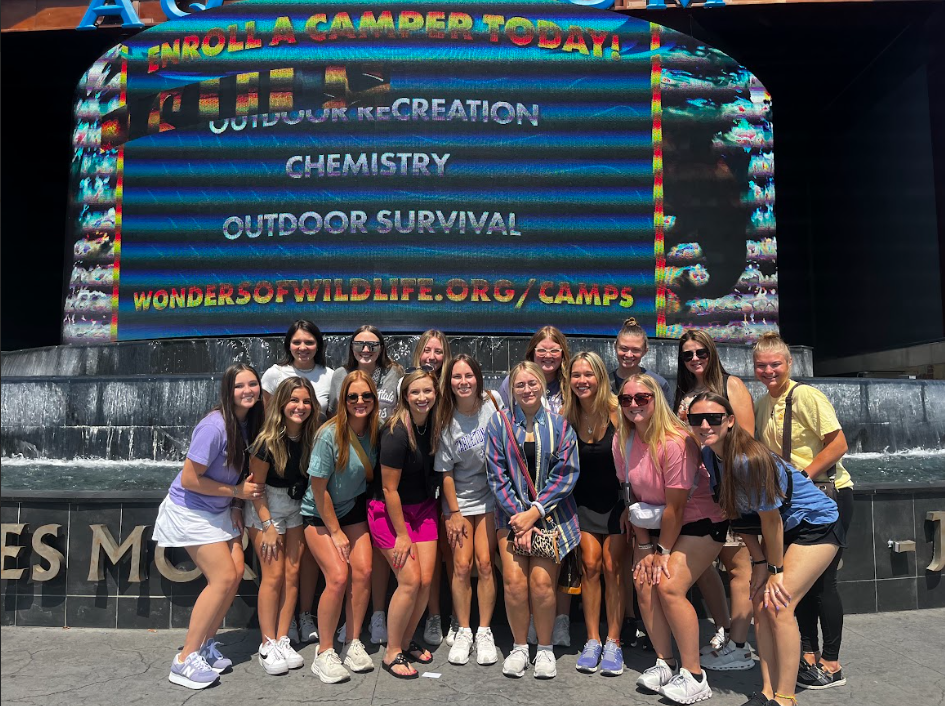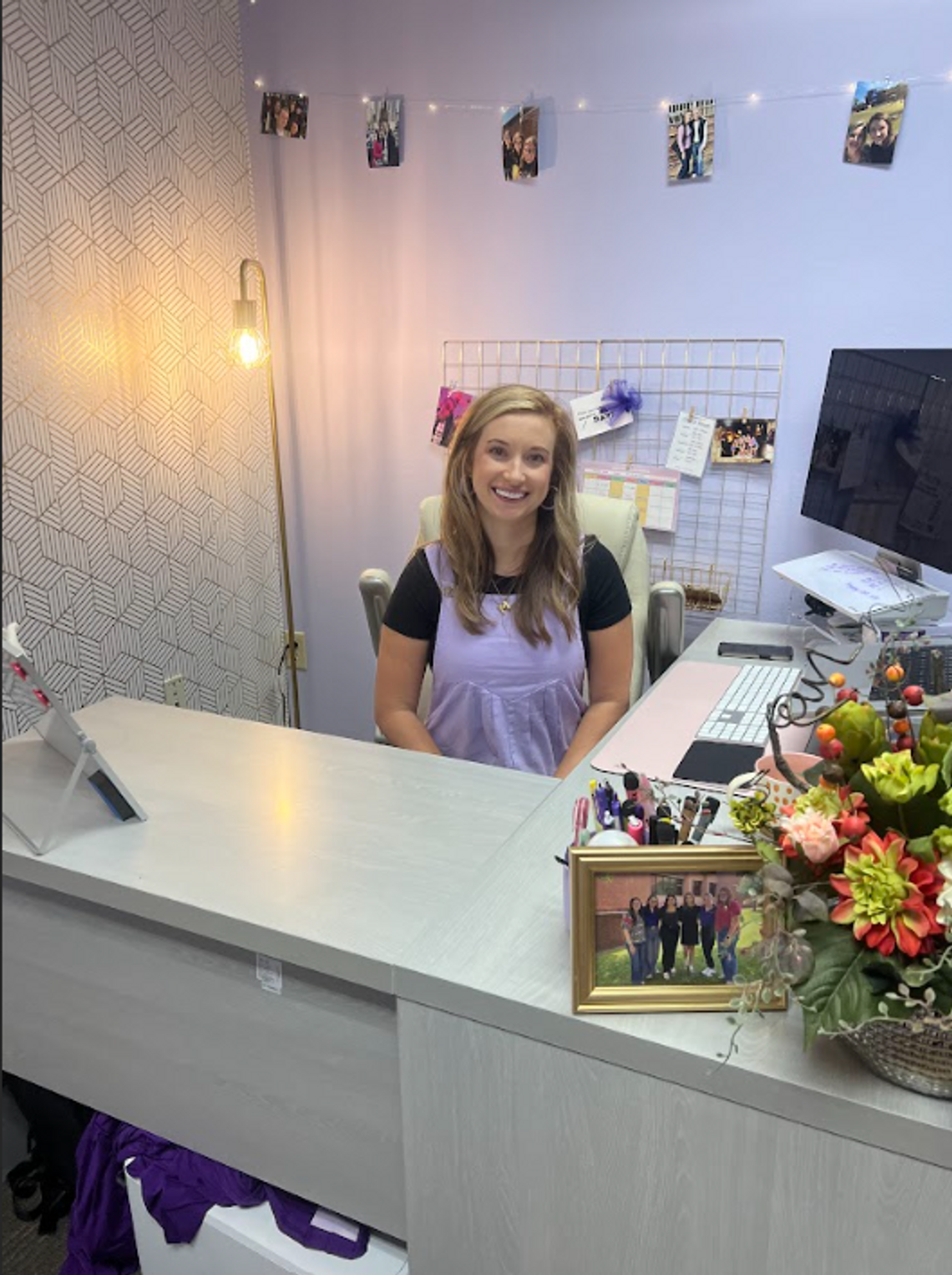BY MACKENZIE JOHNSON / Multimedia Journalist
Tarleton State University is nearly bursting out of the seams of the Stephenville stitched community.
Newly painted spots of a parking garage have dried, the foundation of an indoor events center has been poured, blueprints to build more dorms for students have been drawn up and grants to improve expanding degree programs have been permitted.
One of the degree programs at the receiving end of Tarleton’s endowment is agricultural communications, and one of the advisers getting to forge the path for new students with these department elevations is professor Morgan Jackson.
“If you asked me five years ago if I would be in teaching, I would have probably said no,” Jackson said. “I was in marketing agency life when Dr. (Chandra) Andrew came to me and asked if I could help out with some adjunct classes.”
Jackson is a Tarleton alumni and was a student before the agricultural communications degree materialized. As a result, she has an undergraduate degree in agricultural services and development with a concentration in communications and a master’s in agricultural and consumer research.
“I really loved teaching from the first time that I took over a class for that semester,” Jackson said. “I'm extremely passionate about giving back within the agriculture industry and to our younger generations that are upcoming to be the voice of agriculture. Being a mentor and role model for students within the classroom to help them figure out what their path looks like is something that I take very seriously.”
Jackson has helped many students carve out what their agriculture path looks like, and although it’s not a particularly easy undertaking, her guidance makes the daunting presence of students’ futures more approachable for agricultural communications majors.
“Morgan’s been a really big inspiration for a lot of people in our agricultural communications majors,” Taya Webb, a student of Jackson’s and secretary of the on-campus club Agricultural Communicators of Tomorrow, said. “She’s helped draw a lot of people into the major and always puts her students above herself.”
Although Jackson has been at Tarleton for more than two years now, this is her first year as full time faculty.
After starting as an adjunct instructor, she shifted into the role of a visiting professor before joining Tarleton officially.
Alongside teaching five courses each semester and a couple in the summer, Jackson also helps lead a summer abroad trip through the university sanctioned organization Agricultural Communicators of Tomorrow.
“I’ve been fortunate enough to take over and assist as adviser for ACT, a student organization that we help with through agricultural communications,” Jackson said. “Our big mission within ACT is to try and drive home how important networking and finding your people is.”
ACT offers several social and professional development events throughout the year to encourage like minded students to build networks and their resumes in order to best promote the industry of agriculture.
“Morgan has turned our ACT program around for the better,” Mady Horton, president of Agricultural Communicators of Tomorrow said. “I know from personal experience that she is always there for her students no matter what and no matter where.”
Being such a passionate leader to ACT students has provided Jackson with the avenue to truly make a difference in their lives, not only through strengthening their voices as college students, but also as agriculturalists.
“If we as agriculturalists cannot advocate and bring a positive light to agriculture, who else is going to do it?” Jackson said. “We're the actual ones that have boots on the ground and have agricultural backgrounds. We are the voice of agriculture and we have to make sure that we are advocating for our industry”
Learning the steps to advocating for agriculture isn’t something that starts after graduation for agricultural communications students, but rather now.
“If you are not building your network as a young individual, you're missing a mark as far as helping yourself grow over time,” Jackson said. “You never know when that person who came and spoke in your classroom or that person you met at a professional development conference could be a resource that you could later call on. You may not need them today, but you could need them tomorrow, six months or five years down the road.”
Outside of building connections and portfolios, Agricultural Communicators of Tomorrow also offers travel opportunities.
“We offer a study away trip in the summer where we attend AMS (Agricultural Media Summit), the largest marketing, journalism and professional development conference for our industry,” Jackson said. “We take students on a study away course and offer different industry stops along the way before we get the conference destination”

Beyond the AMS trip, ACT members were given the chance to attend a 24 day trip to the UK over the summer to visit the embassy and talk about the agriculture policies taking place there.
Becoming a national member also allows students to attend PDC, the Professional Development Conference, held at Oklahoma State University this year and be a part of Critique and Contest, a contest involving categories like writing, photography and more for ACT members across different universities nationwide to compete in.
Details for joining ACT can be found on their Facebook page, Tarleton Agricultural Communicators of Tomorrow.
Jackson credits Tarleton for the wide scope of possibility offered not just within ACT, but the agricultural communications department as a whole.
“We are extremely fortunate here at Tarleton to offer a variety of in-depth and trending equipment that our students actually get to use in the classroom,” Jackson said. “That's one thing that Tarleton really excels at: giving students opportunities to obtain the foundation of learning that allows them to stay up to date with the trends (in the industry).”
Having access to top notch equipment has helped provide students with a fully stocked toolbox of resources, but those resources are no good unless students open those toolboxes and get their hands dirty.
“There's a lot of times when we're going to go out as communicators within agriculture and know that we're going to have to ask the hard questions,” Jackson said. “At times, we must understand we may not be super comfortable talking in front of people or doing interviews, but we still have to figure out how to grow in that area and overcome those obstacles that we’re faced with on a personal level to make sure that at the end of the day, the story is being covered.”
Advocating for any industry requires courage, but as Tarleton’s agricultural communications program flourishes more each semester, the up and coming groups of communicators may just be getting gutsier.
“If you look at our classroom sizes, they're doubling, even tripling, from what they used to be a couple years ago,” Morgan said. “A lot of people are really seeing the value in agricultural communications and that’s why it’s continuing to grow with each generation that comes to Tarleton and beyond… The opportunities for agricultural communications are endless.”
And what makes Tarleton’s communicators so special is that they aren’t waiting for tomorrow for those opportunities - they’re starting today.
.png)

Comment
Comments